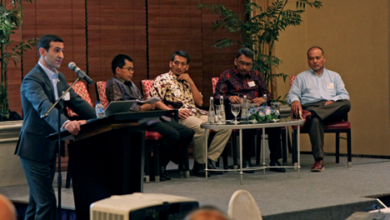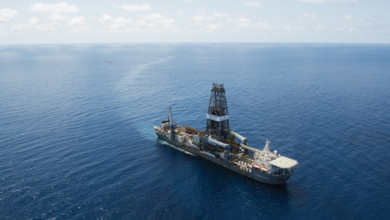Agency planning new regulations on drilling permits and well integrity, bidding round for onshore fields, including some unconventionals
By Kelli Ainsworth, Editorial Coordinator

Low oil prices will not derail the Mexican government’s plans to hold its deepwater auction on 5 December, said Juan Carlos Zepeda Molina, President Commissioner for the National Hydrocarbon Commission (CNH). Ten deepwater blocks in the Mexican Gulf of Mexico will be on offer. “The government is going to carry out these biddings regardless of the oil price movements. That’s what a reliable and predictable government does,” Mr Zepeda said during a visit to IADC’s Houston headquarters on 9 March. “It’s up to the industry to decide whether it’s in their interest to invest in these blocks. It is not on the regulators to decide when to open or close the market,” he added.
To encourage participation in the auction, however, CNH has introduced a new provision to deepwater contracts that will provide operators with additional flexibility during the exploration phase. Operators will not be obligated to drill any wells during the first four years of the exploration period on these blocks. “The minimum investment commitment is related to doing seismic activity and superficial exploration activity,” Mr Zepeda said. “After the fourth year, if they want to keep working on the area, then they will have to commit to drill.”
The option to conduct lower-cost seismic activity for the first four years, in addition to the long-term nature of deepwater developments, has attracted strong interest in the deepwater round despite current market conditions, Mr Zepeda said. So far, nine companies are formally registered to bid, while approximately 20 more are reviewing seismic data on the blocks up for auction.
CNH also plans to announce details for bidding on onshore fields, including some unconventionals, by this summer. Further, the agency anticipates that it will hold bidding for PEMEX farm-outs this year in order to find partners for the national oil company in some of its fields.

In addition to its role as Mexico’s E&P contracts administrator, CNH also serves as Mexico’s upstream E&P regulator. In this role, CNH plans to implement new regulations on drilling permits and well integrity, as well as on gas management, this year. The agency has been consulting with industry stakeholders and experts, including IADC and the US Bureau of Safety and Environmental Enforcement (BSEE), to get input on these regulations. In addition to providing technical guidance, IADC has also been helping CNH to identify and define the qualification needed to certify individuals as technical experts who can issue permits and supervise drilling. The goal, Mr Zepeda said, is to bring industrywide standards to Mexico.
Looking to the long term, CNH has set gaining the trust of the Mexican people as a top priority, Mr Zepeda said. “Our most important goal, our vision as a regulatory entity in Mexico, is to earn the trust of the Mexican people and, of course, the industry,” he said. To accomplish this, the agency has focused on being as transparent as possible. For example, there are strict rules governing how and when CNH board members can meet with oil companies. At least two of the seven board members have to be present for such a meeting, the meeting will be recorded, and minutes from the meeting are made public.
In addition, CNH has established extra rules when it comes to addressing oil companies’ questions within the bidding process. Rather than meet with companies individually, the agency created a web page for such queries. All questions and answers are publically available for review. “Everything is disclosed and can be reviewed by any citizen,” Mr Zepeda said. “We believe we are creating a new standard in the industry in terms of transparency.”
On the actual bid day, which is open to the public and streamed live, CNH receives and reviews bids from prequalified companies and awards the contracts on the same day. “This is a new industry in Mexico,” Mr Zepeda said. “There is a lot of interest from citizens in how we are running this. That’s why we put so much effort in doing this the transparent way, because we know it’s important for Mexican citizens.” DC
Click here to view a video with Juan Carlos Zepeda Molina, CNH President Commissioner.
Click here to learn more about Mexico’s Round One of licensing (Spanish only).




